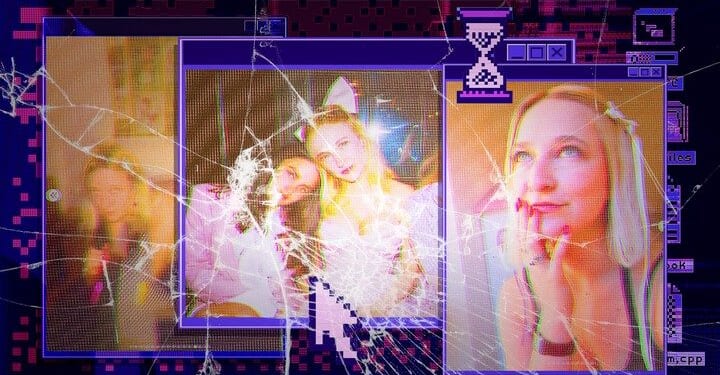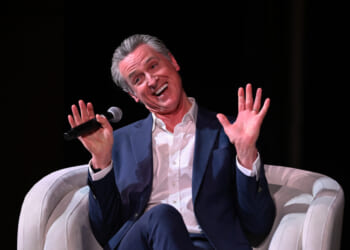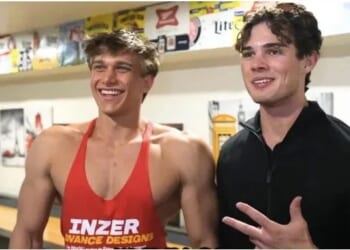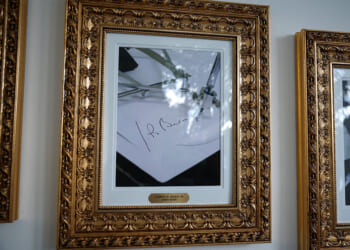Flat Earth, the debut novel published this month by Anika Jade Levy, is the latest entry in a genre that purports to capture the experience of young, elite, female, internet-poisoned New York. Such books are generally written by young women in the “downtown lit scene,” with forerunners including Paradise Logic, by Sophie Frances Kemp, and My First Book, by Adderall-abusing pandemic-era podcast star Honor Levy.
Their reception depends as much on the author’s clout as on her talent, thus Flat Earth has been widely, and not too negatively, reviewed. The novel’s world of art parties and trust-fund “crust-punks” is the familiar one of the overeducated, underemployed New York that centers on the Dimes Square neighborhood, where status comes from artistic success, and everyone is seeking it. And the blood that drips off the protagonist’s finger every time she swipes her shattered phone-screen is an apt metaphor for the internet’s effect on mental health. But if this is the novel that will “soon be in the hands of cool girls everywhere,” per the headline of a recent review — pity the cool girls.
Flat Earth is interesting, if at all, as a display of the toxic id of the clout economy, and it is the clearest example yet of a disturbing trend by young women writers toward grabbing eyeballs through porn-coded sexual self-degradation.
The novel tells the story of a young woman on the downtown scene, Avery, who is jealous of her best friend, the more beautiful and successful Frances — a situation presented without self-interrogation or critique. Avery tells us she would “follow [Frances] anywhere,” yet her main value for Frances seems to be because through her, Avery has met some cooler, richer friends. Avery is also obsessed with being “15 pounds fatter” and less talented than Frances. Might Frances prefer to be viewed as a human being, and not for her weight or social connections? The book doesn’t ask. Avery also takes every opportunity to snipe at Frances — she’s privileged and inauthentic; her art is opportunistic — without narrative awareness that this is shitty behavior, and worse than any friend-crimes we see Frances commit.
The petty non-drama shares several points of biographical similarity with the author’s life. Levy became a fixture on the downtown lit circuit after co-founding the niche lit-mag Forever with best friend Madeline Cash. Flat Earth, Levy’s first novel, is published by small-press Catapult; Cash’s second novel will be out this January from Farrar, Straus and Giroux, perhaps the most prestigious imprint in America. In the book, Frances makes a successful film, then leaves Avery behind to turn trad-wife; in real life, Cash has departed from the editorial team at Forever.
Whatever the truth of the two women’s relationship, the biographical overlap at least marginally gestures at a simulation of truthfulness and self-exposure for the purposes of fiction. This character, Levy suggests, is showing us nothing more than the ugly reality. Avery is “ostensibly in graduate school” for media studies, but actually doing sex work to pay the bills. Her own mother calls her “hypersexual and materialistic.”
She worries constantly about aging, wants everything she sees advertised, thinks of herself in terms of market value, and casually declares herself self-involved. The author’s choice of forgoing likability in a female protagonist, which can sometimes be interesting, feels merely oblivious. Naturally, Avery is the only character with any reality on the page, and everyone else is a prop, which seems less like a narrative choice than a narrative failing.
Avery is supposed to be writing “cultural reports” for her degree, but she’s also not very productive, and the reports litter the book as interstitial chapters of lazy trends and flotsam from the online news — she reports on economic conspiracies, art-world scandals, seed oils, and 3-D printed guns. Attempts to be satirical or playful with cliché fall flat. In one, a “popular digital artist” forms a “conceptual online pedophile ring” — for the most trite example of a risqué project one could come up with. In another, the currency “spends like Monopoly money.” The “girls” put it up their noses and the “men spend it at the racetrack,” whatever that’s supposed to mean.
This reaches its apex in the character’s sexual relationships. The story starts during the Adderall shortage of 2022, when Avery is dating “the first man to be sufficiently violent with me.” After he carves his initials on her chest, she moves on to a married law professor at her university, who is “decrepit and unkind” and misses her signals that she would like to be “choked but not killed” during sex. Which, naturally, she doesn’t really enjoy, instead lying there staring at that old chestnut, the “stains on the ceiling.” Next comes a sculptor, who is “more successful at infantilizing me” than the law professor, though he is younger. Avery tells us that her breasts sag, she sleeps with her stuffed animals, and at one point she blacks out and then takes a bunch of pictures of her bloody face for social media.
The author seems to intend a social critique in all this. Levy’s cultural referents are red-pilled: she makes random references to marriage, fertility, childbearing, and Catholicism, with little distinction made between maybe someone will marry me and I like to be choked. This could be a vicious critique of patriarchy and red-pilling, but Avery participates so willingly, it doesn’t seem like one. Taking feminism seriously is as off-trend as the climate protesters Frances turns her camera away from in an early scene. Instead, the family values float by interchangeably with the rest of the memes, neither better nor worse for women than what came before. If forming a relationship or becoming a mother might deepen Avery’s humanity is not seriously considered. Levy’s real target seems to be the degrading on-screen world which flattens this, and all other human potential.
“The family values float by interchangeably with the rest of the memes.”
Fair enough, but is it literature? That the internet and online pornography are bad is extremely well known. Real life lies behind the cut, whether Avery can see it or not: the friends betrayed; the lovers unseen; the homes wrecked; the mother and grandmother worried. Complex, human, novel-worthy topics lie here, even in our toxic age, and if Levy were able to acknowledge them, it would make a better book.
There’s also the issue of complicity. When discussing her mentor, an older writer named Sally, Avery observes that “lots of girls felt close to Sally’s writing because she had written about degrading sexual experiences with eroticism and intelligence, which is all anyone really wants from a book.” If that’s all anyone wants from a book, Levy has attempted to supply it, too often minus the eroticism and intelligence. She’s right that the pulse of sexual degradation is inherently interesting, and that Flat Earth’s most engaging quality is the spectacle of violent sex and Avery’s self-directed misogyny. Levy isn’t alone in mining this. A good deal of the enjoyment of Kemp’s Paradise Logic was its zany embrace of similar porn tropes — the female protagonist as cum-dump, hilarious!
In an attention economy, this makes sense. What do literary it-girls crave and need, beyond attention, achieved by any means necessary? In one of Flat Earth’s funniest moments, Avery observes that “I didn’t understand why men were always talking to me about Mary Gaitskill,” whose work she claims not to like. Gaitskill is our preeminent poet of women’s sexual degradation, and writes brilliant, unflinching, and uncomfortably erotic explorations of sexual damage. Naturally, Avery, who is busy damaging herself and learning nothing from it, wouldn’t like her work.
The moment is craven and insightful, yet disappointing. In a society in which feminism has triumphed by every measure, and most meaningful barriers to women’s professional and economic achievement have been dismantled, this is still where we are, now more than ever? The male “downtown-scene” novel tends toward grandiose claims of rewriting the canon, and at least makes the attempt at big, epic books addressing politics and history, with accompanying stylistic and structural innovation. We have yet to see one of these books really succeed, and in some ways the ego-fantasy is parallel, yet the men are men, not it-boys, and whatever they’re doing, it’s the opposite of degrading themselves. In 2025, for women writers, isn’t the full porn-world route something of an own-goal?
The bizarre truth of it is that women and men are worse off in their relations than ever. And thus the pain, ugliness, and confusion on display in this book are, at least, signifiers of the complex and real. We need novels — by women — that explore these issues instead of merely attention-seeking and regurgitating the internet.

















